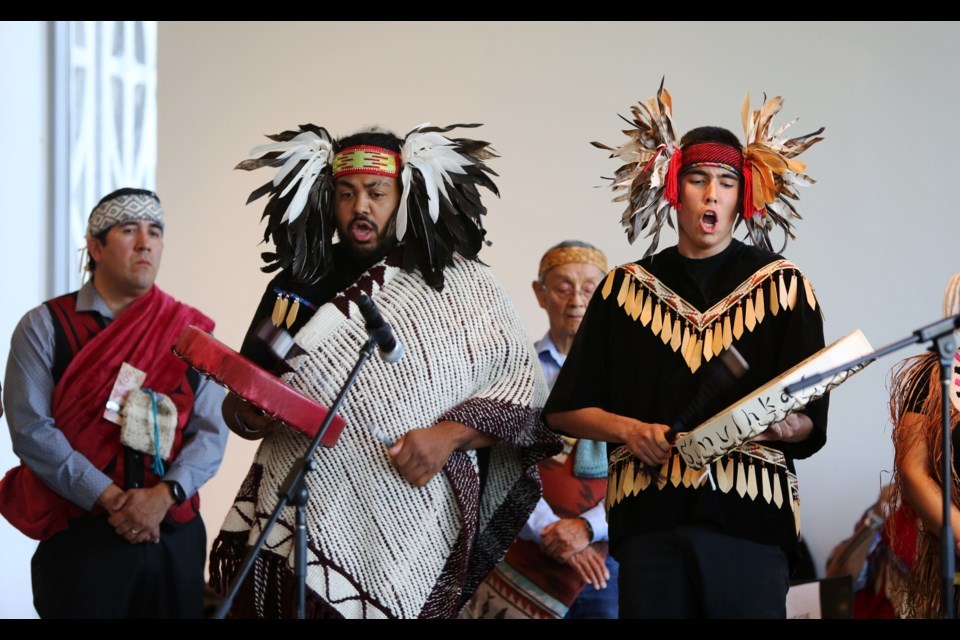City council will decide June 25 whether to approve a plan to begin implementing a series of actions agreed upon by the City of Vancouver and three local First Nations that aims to right historical wrongs and recognize rights and title of Indigenous peoples.
The city’s UNDRIP strategy, which was developed with the Musqueam, Squamish and Tsleil-Waututh nations, is the first of its kind for a Canadian municipality and recommends a wide-ranging set of actions that include returning lands to the nations and revenue-sharing agreements.
The previous council approved the document in October 2022.
The four governments have since drafted a comprehensive “action plan” to implement the strategy. Although it is expected to get unanimous support from Mayor Ken Sim and the 10 councillors, council still has to formally approve the plan.
Meanwhile, the achievement is being celebrated Monday (June 3) at the Vancouver Convention Centre. Sim, members of the First Nations and task force co-chairs Coun. Christine Boyle and Khelsilem of the Squamish Nation will be present for the ceremony.
The ceremony is being held in advance of council’s vote June 25 to uphold the tradition and laws of First Nations. A similar ceremony was held at the Museum of Vancouver in October 2022, a few days before council approved the UNDRIP strategy.
'Environmental racism'
UNDRIP is the acronym for the United Nations Declaration on the Rights of Indigenous Peoples, which was adopted by the UN General Assembly in September 2007. The provincial and federal governments have since passed legislation to implement UNDRIP.
The city released the action plan May 31 to reporters who attended a virtual technical briefing on the plan.
The plan does not provide specifics, for example, about potential land transfers or revenue sharing, but sets out a framework to address several issues, including revising city policy and advancing economic reconciliation.
Categories identified in the plan are “relationship foundations, redress, housing and land, cultural presence, stewardship and addressing environmental racism, communication and accountability.”
The plan also emphasizes the need for the city government to develop “effective mechanisms for urban Indigenous residents to access opportunities and resources to engage in Vancouver.”
Training for city staff is also another recommendation.
Revenue sharing
When the city and nations released the UNDRIP strategy in 2022, it listed several recommendations, some of which include:
• Have the city work with the Musqueam, Squamish and Tsleil-Waututh to identify parcels of land which are “culturally, economically and socially significant” and return them to the nations.
• Identify options for revenue sharing to the three nations via property taxes collected by the City of Vancouver.
• Redistribute fees to the nations that the city collects from developers; this would be seen as redress for lands lost that cannot be developed by the nations.
• Expand the Vancouver Police Board membership to include representatives from the three nations.
• Provide funds, staff and space for the nations to train liaisons with the Vancouver Police Department, particularly in the Downtown Eastside, where there is a large Indigenous population.
• Prioritize affordable housing for the nations that go beyond reserve lands.
• Undisputed access to municipal services for reduced or minimal fees to affordable housing projects on reserve lands.
• Reconciliation curricula in schools that teach the relationships between the three nations and the land and its people.
• Identify and address barriers including but not limited to parking fees and time limits.
• Improve recruitment, retention and advancement of Indigenous peoples in City of Vancouver careers.
• Shape a process for the Vancouver Economic Commission to bring its policies and procedures in alignment with UNDRIP to include and reflect the nations and support their economic prosperity.
• Update City of Vancouver procurement policies to ensure contract opportunities are reserved for businesses owned by or partnered with the three nations.
A budget hasn’t been finalized to implement the strategy, although it is expected funds will come via the city, with additional money sought from the provincial and federal governments.





